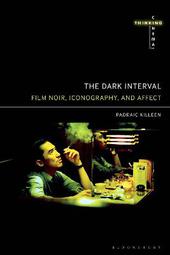
|
The Dark Interval: Film Noir, Iconography, and Affect
Hardback
Main Details
| Title |
The Dark Interval: Film Noir, Iconography, and Affect
|
| Authors and Contributors |
By (author) Padraic Killeen
|
| Series | Thinking Cinema |
|---|
| Physical Properties |
| Format:Hardback | | Pages:272 | | Dimensions(mm): Height 229,Width 152 |
|
| Category/Genre | Film theory and criticism
Philosophy |
|---|
| ISBN/Barcode |
9781501349683
|
| Classifications | Dewey:791.43655 |
|---|
| Audience | | Tertiary Education (US: College) | |
|---|
| Illustrations |
38 bw illus
|
|
Publishing Details |
| Publisher |
Bloomsbury Publishing Plc
|
| Imprint |
Bloomsbury Academic USA
|
| Publication Date |
2 June 2022 |
| Publication Country |
United States
|
Description
Invoking key concepts from the philosophical writings of Gilles Deleuze and Giorgio Agamben, The Dark Interval examines a subtle but distinct iconography of passivity, stillness and profound self-affection that recurs across noir films of every era. In doing so, it identifies the emergence of a specific cinematic figure - the 'intervallic' noir protagonist exposed to the redemptive force of his or her own passion. Significantly, the book contextualises the iconography of film noir in relation to prior art-historical visual traditions, in particular earlier representations of melancholia and the saturnine, locating noir against a much broader canvas than has been the norm. Examining central noir films of the classic and modern era (The Killers, The Man Who Wasn't There) as well as films at the peripheries of noir (from Jacques Tourneur's Cat People to Wong Kar Wai's 2046), the book locates a series of iconographic gestures, performance traditions and affective tonalities at once specific to noir and yet resonant with a deeper cultural and philosophical heritage. It is a meditation that uniquely grapples with the look and the feel of noir, and which dares to detect a unique quality of 'beatitude' that runs through a certain strain of noir films. In doing so, it illuminates why film noir remains one of the most provocative and affecting visual milieus of our time.
Author Biography
Padraic Killeen is a media scholar and arts journalist. He holds a doctorate in film from Trinity College Dublin, Ireland, where he has taught on Film Noir, European Cinema, and Digital Film. He has also lectured in Film and Digital Cultures at NUI Galway, Ireland. He is a keen video essayist and digital humanist; his video essays on film have appeared in [in]Transition and Frames Cinema Journal. His research interests include iconography, intertextuality, and adaptation.
ReviewsFilm noir, Padraic Killeen argues, is a cinema of missing persons. It is around this condition of missingness, gleaned from intervallic moments of inertia and irruption, passivity and passion, arrest and absorption, that this perceptive and philosophically probing study gracefully pivots. Through an eclectic and innovative montage of theories and films that effortlessly transcends the discursive constraints of genre, period, and style, The Dark Interval presents a fresh and conceptually rich prism that brings out a paradoxically redemptive light from the shades of noir. * Henrik Gustafsson, Professor of Media Studies, Film & Visual Culture, University of Tromso, Norway * One of the classic images of Film Noir is the moment where the hero pauses to light a cigarette and exhale slowly as if unaware of the narrative's demand for action. Now, in this masterly study of the genre from philosopher-theorist, Padraic Killeen, that moment gets its due. Arguing for this state of apparent passivity to be considered as a 'dark interval' or glimpse of potentiality, Killeen invokes a pantheon of thinkers - Gilles Deleuze, Maurice Blanchot, Giorgio Agamben, Slavoj Zizek and others - to tease out just how this might affect our reading of Noir. As he moves easily between his choice of texts, from classic films such as Jacques Tourneur's Cat People through The Long Goodbye, Alphaville, Wong Kar Wai's 2046 and The Big Lebowski, Killeen demonstrates an extraordinary facility for interrogating established perspectives while always remaining lucid and focused. This is at once a film lover's guide to Noir and a rigorous application of philosophical thought to one of popular culture's most enduring genres. * Ruth Barton, Head of School of Creative Arts, Trinity College Dublin, Ireland *
|